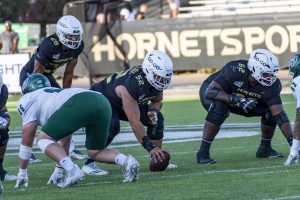Letter to the Editor
April 11, 2012
In response to the article, “Bring out your dead” written by Mikhail Chernyavsky I have listed some facts that shed more light on Mr. Chernyavsky’s opinion:
1. “A little known practice of baptizing the dead”. Although baptisms for the dead are performed in temples to which the general public are not invited the practice is a known and publicized practice which The Church of Jesus Christ of Latter-day Saints has not denied nor hidden.
2. “A representative will take on the sin of the dead person and be baptized in that person’s name”. As stated in the report done by NPR, and as has been written about in other publications an individual does perform baptism in proxy for an individual who is dead. The representative does not take on the sin of the person for which they are being baptized. As the word proxy indicates or denotes the living individual stands in, and acts as a substitute, for the deceased in performing the ordinance of baptism. This follows a biblical and long standing belief held by mainstream Christianity that to enter into Heaven a person must be baptized.
3. “This is an issue of respecting the beliefs of others, something with which the LDS has problems”. Although this is an opinion I will apply to the fact that in the Thirteen Articles of Faith written by Joseph Smith is the statement, “We claim the privilege of worshiping Almighty God according to the dictates of our own conscience, and allow all men the same privilege, let them worship how, where, or what they may.” As this is written into the basic tenets of our beliefs it is difficult to align your statement with what I have been taught within the culture of my faith. Though there are a number of people of Jewish decent who have converted to the “Mormon” faith the Church has in place a policy and understanding with the Jewish community, The Memorandum of Understanding agreed upon in 1995, and to those who are members of every faith the statement has been made:
The Church stands by its word. It has no intention of performing baptisms or other rites in its temples for Holocaust victims, except in the very rare instances where such people may have living descendants who are members of the Church. Such exceptions were noted and agreed to in 1995. The understanding reached in 1995 determined that the Church would remove Holocaust names from its public database immediately, which the Church has done. It further said that Jewish groups would provide to the Church any names that reappeared on the database so the Church could remove them. (“Church Responds to Jewish News Statements”10 November 2008)
Such an agreement is a show of respect on both the part of the Jewish community and the Church of Jesus Christ of Latter-day saints.
4. The SacState Hornet is a newspaper written by and for students of Sacramento State University. The fact that an article was printed which states, “You have caused me?to start this hate list”, “crazy church practice”, “wacky mainstream cult”, and “as worthless as Joseph Smith’s magical glasses” as well as the comparison of the actions of the church with actions by Hitler are all considered hate based. If you were to print an article using this same terminology in regard to race, gender, sexual orientation, or another religion I would hold the same distaste for such ignorant and bigoted statements.
In closing I will appeal to those editing and researching such articles to look deeper into the sources from where these opinions stem. I have found on the internet the article Mr. Chernyavsky may have been making reference to (Holocaust Survivors Battle Mormon Ritual, by Robert Smith). I have also been able to locate the official response to the original article by The Church of Jesus Christ of Latter-day Saints (a copy of which I have provided for you). Understanding that this is the “Opinion” section of the newspaper I realize that any individual is welcome to share whatever opinion they have, however when facts are used within the article those facts are not opinion, they are not subjective, and in academia sources should have direct references. For example in the adjacent article, written by Vanessa Guerrero, she quoted the source and gave the authors name.
Writing inaccurate facts as opinion will not reflect well on the author, the editor, the newspaper, or the university.
Sincerely,
Beth Durant, Ryan Anderson, Scott Speer, Andrew Miller, Joy Brooks, Breanna Stephen, Christina Cecchettini, Derrick Folkman, Jonathan Medina, Anna Sawyer, and Suzanne Smith
Letters to the editor are always welcome to [email protected].























































































































